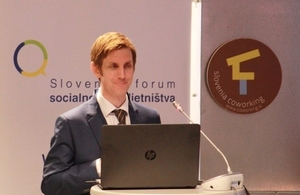British and Slovene social entrepreneurs explore the future of social enterprise
British social entrepreneurs shared their experience and discussed the future of the social enterprises in Slovenia and the EU at a conference in Ljubljana.

Charge d'Affaires James Hilton
The aim of the conference, attended by some 200 participants, was to show how social enterprises provide an important way of tackling Europe’s current economic and social challenges, especially among young unemployed and disadvantaged populations.
Charge d’Affaires James Hilton held the opening address of the conference. He said:
Following on from a successful royal visit in June 2013, which focused on young entrepreneurs, our goal was to set up a UK-Slovenian enterprise task force, which would share good practice between our countries. We knew that Slovenia had a strong tradition as a social state, while the UK had expertise in social enterprise. A winning combination.
The afternoon part of the conference offered workshops for the participants, which mostly recognised social entrepreneurship as a good opportunity to create new jobs. However, they also stressed that it is essential to exchange experience and information and form a system of mentorship. In their opinion, state and EU aids enable social businesses, however the main obstacles they recognised in setting up a social enterprise due to the lack of information and the abundant amount of paperwork.
The UK is one of the leading countries in the field, with estimates that there are approximately 70,000 social enterprises contributing £18.5 billion to the economy and employing almost a million people. Social enterprises in the UK operate in a range of industries - Cafedirect is the UK’s largest Fairtrade hot drinks company; The Elvis & Kresse Organisation (EaKo) takes industrial waste materials, turns them into stylish luggage and hand bags and donates 50% of the profits to the Fire Fighters Charity; Hill Holt Wood educates at-risk youth in an ancient woodland; Central Surrey Health is a pioneering social enterprise in the healthcare world that is run by the nursing and therapy teams it employs.
The Social Entreprise Initiative was adopted by the EU in a bid to boost economic growth which would be based on good ethics and focused on social work. As a contribution to the initiative, the British Council published a thought-piece ‘What will Social Enterprise look like in Europe by 2020?’ based on a series of interviews with social enterprise experts in the region. It offers an opinion of where social enterprise might be heading in the coming years in Europe.
More about social enterprise in the UK.
More about the British Council’s Vision 2020 for Europe.